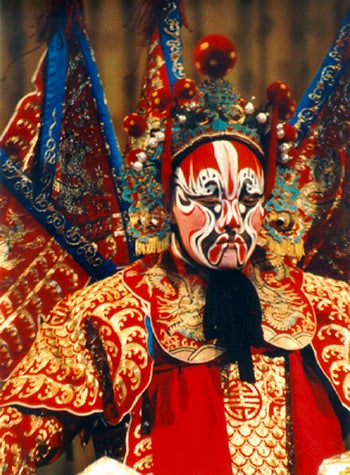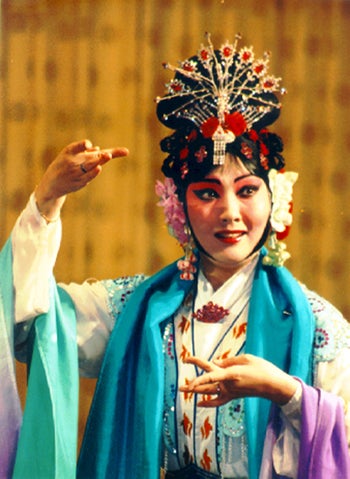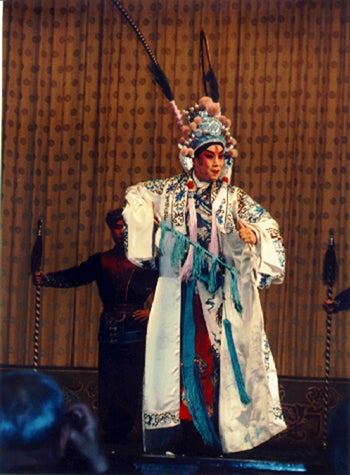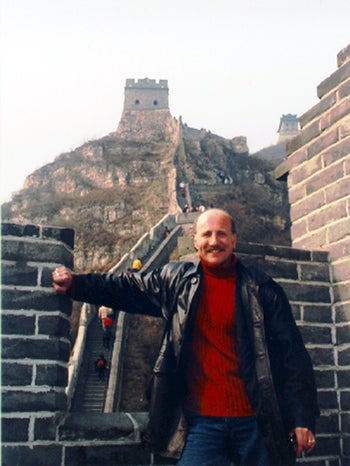 At the BaDaLing Section of The Great Wall
At the BaDaLing Section of The Great Wall
My first trip in China was to Beijing in February 2001. Afterwards, I wrote the following when I got back to the US:
It is fair to say that whatever impression most people have about China and the Chinese people is probably out of date. The rate of westernization for both the country and the people is impressively high. In many respects, staying in Beijing was exactly like a visit to any large US city and not to a West-adapted place where the familiarity falls apart when you scratch the surface. After getting to know the chemistry students we interviewed, especially those we invited to dinner, it is clear that they are also quite modern in their behaviors, goals and ambitions. A person who thinks that working with a Chinese graduate student means supervising an obedient, 100-hour per week technician is going to be increasingly surprised by individuals who will soon be indistinguishable from US graduate students.
Doing science still has challenges in China relative to the U.S. Peking University graduates about 160 BS chemists per year, and about half of them go on to study in the US. Peking University probably has the best resources of all the Chinese chemistry departments, and the laboratories we saw were probably at a 1980-85 level of sophistication. Although the students are still assigned to a research project (rather than selecting), most of them appear to be quite knowledgeable about their work. These students generally had lots of outside interests and, while they worked hard on their chemistry, they also valued having a broader life. They were thoughtful about their careers and many were interested in returning to China after their PhDs for positions in higher education. A number of the faculty at Peking University received their PhD degrees in the US, which might account for some of the contemporary perspectives we heard from the students.
Recruiting issues. Establishing people-to-people relationships is the right thing to do, and possibly historically strategic, because of the emerging independence in China. There were many off-handed comments about the brain drain that were borderline derogatory, so we would say it is becoming increasingly insulting to be perceived as removing the best students to the US by less humanitarian methods. At Peking University, we are the first chemistry faculty recruiters who have actually visited the department, given a seminar, and held an open discussion afterwards. There were 88 students who attended the seminar. Everyone stayed afterwards for the Q&A session, and the speakers were swamped with individual students once the official program ended. The timing of the visit (before the interviews) was also strategic and positive.
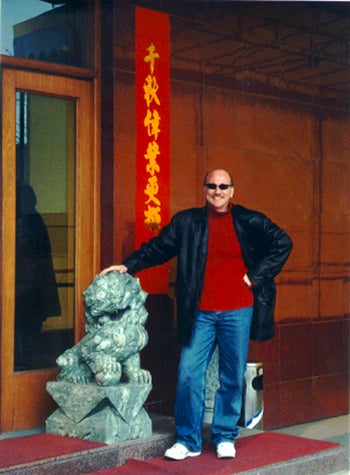 Professor Coppola is known to like to shop
Professor Coppola is known to like to shop
In 2002, we visited Shanghai and Beijing.
Impression from Shanghai. The rate of Westernization appears to be even higher than in Beijing. Many parts of Shanghai are virtually indistinguishable from any international city. Students and the people in general were comfortable and open with us. For instance, students we interviewed openly expressed their disinterest in (and dislike of studying) politics during casual conversation, which is a departure from (what I hear it was) a decade ago.
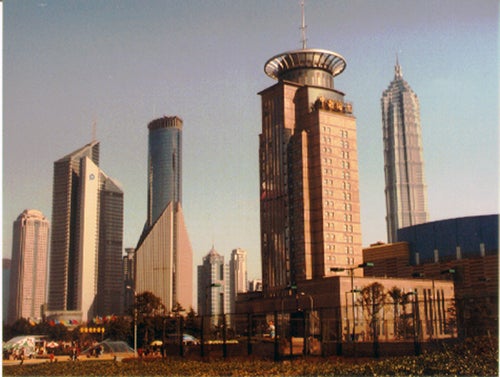 Shanghai PuDong skyline, February 2002
Shanghai PuDong skyline, February 2002
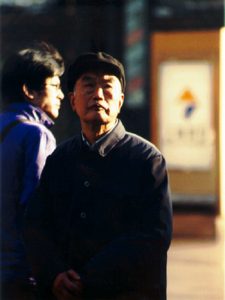
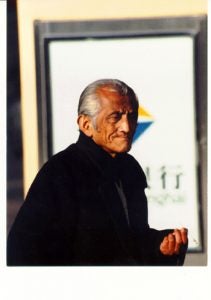
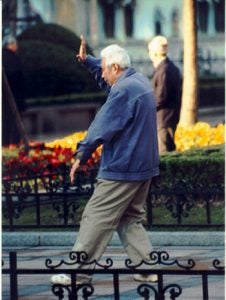
Our hotel (the Sofitel) was located in the center of a km-long pedestrian mall that is a core tourist attraction for the local people. In the morning, on the main central square, dominated by its huge electronic display showing advertisements and history programs, merchants stocked their markets and stores while groups of (mainly) older citizens got morning exercise.
The stores and shops opened by 9 am, and by the end of the day the street was a crowded combination of Las Vegas style light displays illuminating 8-story restaurants, small family diners, department stores, and little food and merchandise shops. At 11 pm the lights were mostly out, but the street was still active.
Because the city was mainly catering to native tourists rather than only accommodating English-speakers, it would have been more difficult than where we have staying in Beijing to meet basic needs as a non-Chinese speaker. A significant fraction of signs and service people could communicate well enough to get you from here to there, but without a native speaker it would have been significantly more challenging to do some things outside of the hotel.
Unlike Beijing, Shanghai has little in the way of long-standing history. It was a non-descript fishing village that happened to be sitting at the entrance of an important waterway. After the first Opium War, China ceded Hong Kong to the British and created a set of treaty ports on the mainland as part of reparations. The port of Shanghai area still exists (the “British Concession” or “The Bund,” directly across the Pu river from the PuDong… the PuXi district… which houses an old but elegant financial district). There is also a French Concession and an American Concession, all of which combined early on into an international zone. All of which means that the modern history of this area, and its development, really only dates to the 1850s.
Meanwhile, in Beijing, a visit to Tiananmen (Tian = heaven, An = peace, Men = gate, so “heavenly peace gate,” or “gate of heavenly peace”) Square. The actual gate, which is behind me, carrying the picture of Chairman Mao, is the entrance to the Imperial Palace (Gu Gong) where Mao declared the founding of the PRC in 1949.
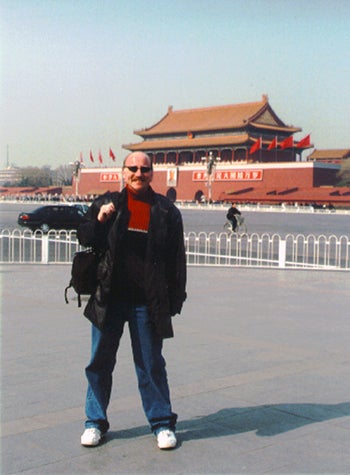
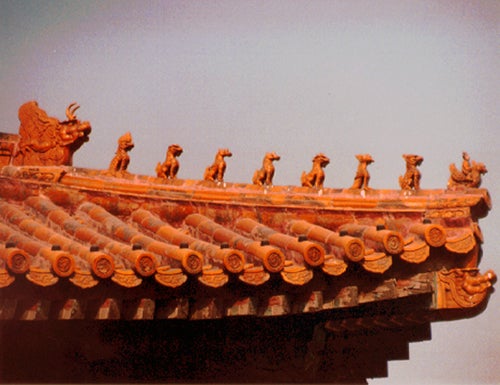
The importance of the Imperial Building increases with the number of “the sons of the dragon” that adorn the edge. All of them are various creatures from ancient Chinese mythology. And as with most mythologies, there are multiple versions of the same story. I love the guy out front. As far as I can tell, no one is quite sure about him and what it is he is riding and why he leads the parade. The most common story is that it is a rooster, which makes sense.
By crowing come the dawn, the Rooster Spirit chases away evil spirits. The Chinese assign the Rooster as a proverbial mascot to the five virtues – civil responsibility, marital fidelity, courage, kindness, and confidence. This creature’s dependability at dawn gives it the additional meanings of punctuality and constancy. Feng shui practitioners paint a red Rooster on a house’s walls for protection from fire or a white one to safeguard the home from demons (and these wooden structures were known for getting ignited by lightning strikes).
Other tales say this is a Phoenix, the female counterpart to the Emperor (the Dragon who brings up the rear of the procession). The poor fellow up front, in the line of fire, was a minion of the Emperor who fell out of grace and was hung from the edge of the rooftop – now and forever leading the procession under the watchful eyes of the Dragon and his sons should he get out of line again.
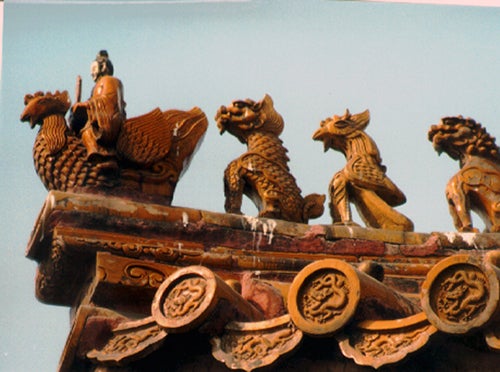
There are only a few instances where the historical name “Peking” is sanctioned over “Beijing” (“Peking” or “PeiPing” being the pronunciation of a former dialect). One of these is “Peking Duck,” one of these is “Peking University,” and the third of these is the “Peking Opera.”
The thousands of folklore stories are told in a highly stylized combination of voice, music, dance, mime, and acrobatics/martial arts. The sound is an acquired taste, but it is worth seeing a few times.
